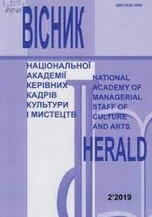HOLIDAY CULTURE OF THE UKRAINIANS IN THE SECOND HALF OF THE 20th – AT THE BEGINNING OF THE 21st CENTURY IN THE CONDITIONS OF MODERN GLOBALIZATION CHALLENGES
HOLIDAY CULTURE OF THE UKRAINIANS IN THE SECOND HALF OF THE 20th – AT THE BEGINNING OF THE 21st CENTURY IN THE CONDITIONS OF MODERN GLOBALIZATION CHALLENGES
Author(s): Alla HotsalyukSubject(s): Customs / Folklore, Sociology of Culture, Transformation Period (1990 - 2010), Globalization, Identity of Collectives
Published by: Національна академія керівних кадрів культури і мистецтв
Keywords: Holiday; holiday culture; festive spectacle; sociocultural approach; sociocultural identity; everyday life; tradition; custom and rite; intangible heritage; festival tourism; Bukovyna, Hutsul;
Summary/Abstract: The purpose of the research is to study the peculiarities of Ukrainian festive culture in the second half of the 20th – at the beginning of the 21st century, taking into account the globalisation trends that are taking place in the world. The methodological basis of the research is general scientific methods of analysis: historicism, systematisation, comparison and generalisation of the investigated problem. Scientific novelty: a feature of the festive culture of Ukrainians in the modern period is the appeal to traditions and rituals, sociocultural identity, intangible heritage, as well as the borrowing of some elements of the celebration of events from other cultures. Conclusions. The category "holiday culture" is considered by researchers as a type of sociocultural activity that is carried out by a person in society on various occasions (events) in the form of a festive spectacle and is different from everyday life. Festive culture can be considered through the prism of a sociocultural approach, where the main form of interaction between people is a symbolically constructed action – the so-called "special event" (festival, performance, concert, celebrations, ceremonies). Today, festive culture is also a modernised understanding and reflection of rites, traditions, and customs, which can be presented as separate performances (events) or as parts of a large event. In the second half of the 20th century and at the beginning of the 21st century, quite noticeable processes of transformation took place in the holiday culture of the Hutsuls in Bukovina, connected with the Christmas and New Year holidays. In addition to the shortening of the holidays in time, there was a truncation of certain components of the holidays, in particular, the loss of full texts of the verbal formulas for summoning the storm, thunder to the Holy Supper, following various beliefs and omens. With the passage of time, the external form and nature of celebrating events (holidays) changes, but the idea and a number of dominant functions that correspond to the basic aspirations of people remain unchanged, namely to ensure well-being and happiness, which in the perception of contemporaries are associated with a professional career; wishes for good, health; predicting the future and influencing it; reference to the national calendar; respect for public holidays, folk art. The holding of annual nativity scenes led to the emergence of festival tourism. With the passage of time, the external form and nature of celebrating events (holidays) changes, but the idea and a number of dominant functions that correspond to the basic aspirations of people remain unchanged, namely to ensure well-being and happiness, which in the perception of contemporaries are associated with a professional career; wishes for good, health; predicting the future and influencing it; reference to the national calendar; respect for public holidays, folk art. The holding of annual nativity scenes (vertep) led to the emergence of festival tourism.
Journal: Вісник Національної академії керівних кадрів культури і мистецтв
- Issue Year: 2022
- Issue No: 3
- Page Range: 3-9
- Page Count: 7
- Language: English

